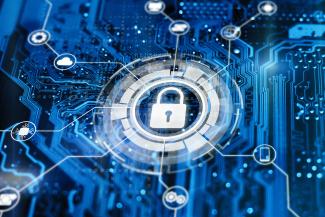
Cybersecurity Best Practices: Safeguarding Sensitive Information Through Encryption and Password Security
In today's tech-driven world, the Internet is an essential tool for communication and information exchange, whether it be sending a message to your family via text or sharing tax documents with your bookkeeper. Regardless of what your day-to-day uses for the internet are, it is important that it be known that the convenience of sharing sensitive information online comes with the inherent risk of data breaches, hacking, and unauthorized access. To protect ourselves and our valuable personal data from cyber threats, it is crucial to implement practices that facilitate cybersecurity when sharing sensitive information over the Internet.
There are two key guidelines to know and understand that will greatly improve the security of your online information: firstly, utilizing strong encryption protocols and, secondly, optimizing password strength.
Encryption tactics are ways that you can ensure your information is much more protected against online threats, such as hackers, and can contribute greatly to preventing data breaches. Some crucial and simple encryption methods are implementing multifactor authentication, using a VPN, sending files through secure file-sharing software, keeping your operating systems up-to-date, and being aware of phishing scams.
Multi-Factor Authentication will add an extra layer of security to your accounts by requiring multiple forms of identification before granting access, and employing a VPN (Virtual Private Network) when accessing the internet from public Wi-Fi networks will encrypt your internet connection from potential 'eavesdroppers' lurking on unsecured networks. Cyber attackers often exploit vulnerabilities in outdated software and operating systems, so ensuring that all your devices, apps, and programs are regularly updated with the latest security patches, and updates will also go a long way to protecting and encrypting your data. Also, only sending your information-sensitive files or documents via a secured file-sharing platform will prevent unauthorized users from accessing your information once it has been sent via the Internet. For example, our office uses software called 'Sidedrawer' to allow our clients to send us their information-sensitive files with maximum security.
It is also imperative to note that cyber threats appear much more directly than some may expect. Phishing remains a prevalent cyber threat, and it often starts with an innocent-looking email or message designed to trick recipients into divulging sensitive information. Always be vigilant and double-check the sender's address, links, and attachments before clicking on anything to prevent yourself from falling victim to a breach.
Being aware of phishing attempts, implementing Multi-Factor Authentication, ensuring your software and operating systems are not outdated, thus making them more vulnerable, sharing files only through reputable, secure file-sharing services, and using VPNs while on public servers; are just some of the main encryption tips that will allow your data to be that much more protected online.
Similar to encryption, password security is critical to the overall security of your online data.
To ensure their effectiveness, creating strong and unique passwords is essential. A recommended approach is to compose a sentence or combine words that hold personal significance, however, avoid using easily accessible personal information, consecutive characters, dictionary words, or common phrases. The optimal password length should be 21 characters or more, which renders them undecipherable with modern technology. It is also important to never store passwords in web browsers, as this practice poses significant security risks being that browsers are much easier to breach than a secured alternative location. Instead, consider utilizing password managers to store and generate strong passwords securely.
By incorporating these cybersecurity best practices into your daily routine and being aware of encryption/password security, you can significantly reduce the risk of data breaches and protect yourself and/or your organization from cyber threats. The importance of cybersecurity cannot be overstated in today's modern world, and, as we have attempted to make clear, sharing sensitive information over the Internet requires diligent efforts to maintain the confidentiality of this data. In prioritizing cybersecurity, we can confidently navigate this ever-changing digital landscape without overwhelming security doubts. By incorporating these cybersecurity best practices into your daily routine and being aware of encryption/password security, we can add additional protection to ourselves and our information from the ever-evolving threats lurking in cyberspace.

